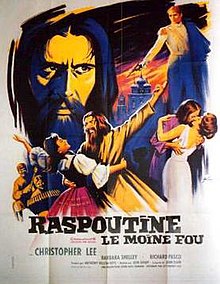
Grigori Yefimovich Rasputin was a Russian mystic and faith healer. He is best known for having befriended the imperial family of Nicholas II, the last Emperor of Russia, through whom he gained considerable influence in the final years of the Russian Empire.

Sir Christopher Frank Carandini Lee was an English actor, singer, and former military officer. In a career spanning more than sixty years, Lee became known as an actor with a deep and commanding voice who often portrayed villains in horror and franchise films. Lee was knighted for services to drama and charity in 2009, received the BAFTA Fellowship in 2011, and received the BFI Fellowship in 2013.

Prince Felix Felixovich Yusupov, Count Sumarokov-Elston was a Russian aristocrat from the Yusupov family who is best known for participating in the assassination of Grigori Rasputin and for marrying Princess Irina Alexandrovna, a niece of Tsar Nicholas II.
Grigori Rasputin (1869–1916) was a Siberian peasant and mystic, who became a healer and adviser for the Romanovs at the end of the Russian Empire.
Hammer Film Productions Ltd. is a British film production company based in London. Founded in 1934, the company is best known for a series of Gothic horror and fantasy films made from the mid-1950s until the 1970s. Many of these involve classic horror characters such as Baron Victor Frankenstein, Count Dracula, and the Mummy, which Hammer reintroduced to audiences by filming them in vivid colour for the first time. Hammer also produced science fiction, thrillers, film noir and comedies, as well as, in later years, television series.

Anna Alexandrovna Vyrubova ; 16 July 1884 – 20 July 1964) was a lady-in-waiting in the late Russian Empire, the best friend and confidante of Empress Alexandra Fyodorovna.

Kiss of the Vampire is a 1963 British vampire film made by the film studio Hammer Film Productions. The film was directed by Don Sharp and was written by producer Anthony Hinds, credited under his writing pseudonym John Elder.
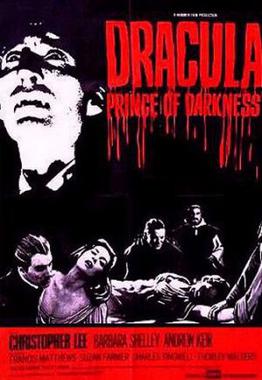
Dracula: Prince of Darkness is a 1966 British gothic supernatural horror film directed by Terence Fisher. The film was produced by Hammer Film Productions, and is the third entry in Hammer's Dracula series, as well as the second to feature Christopher Lee as Count Dracula, the titular vampire. It also stars Andrew Keir, Francis Matthews, and Barbara Shelley.

Barbara Shelley was an English film and television actress. She appeared in more than a hundred films and television series. She was particularly known for her work in horror films, notably Village of the Damned; Dracula, Prince of Darkness; Rasputin, the Mad Monk and Quatermass and the Pit.
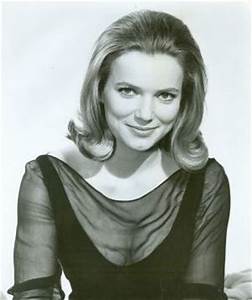
Suzan Maxine Farmer was an English film and television actress. She was regularly cast in movies produced by Hammer Films.
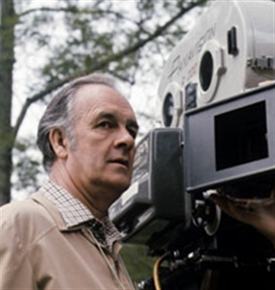
Donald Herman Sharp was an Australian film director.
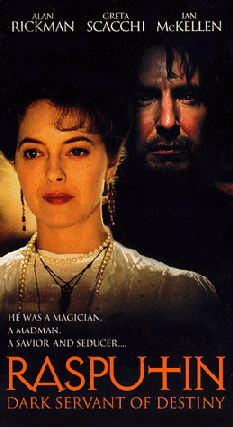
Rasputin: Dark Servant of Destiny is a 1996 biographical historical drama television film which chronicles the last four years (1912–16) of Grigori Rasputin's stint as a healer to Alexei Nikolaevich, Tsarevich of Russia; the heir apparent to the Russian throne as well as the only son of Tsar Nicholas II of Russia and Empress Alexandra Feodorovna; who suffered from hemophilia. The film is narrated in the first person by Alexei.
Rasputin – Miracles Lie in the Eye of the Beholder is a rock opera about the mysterious and infamous Russian peasant, Grigori Rasputin. Written by Michael Rapp, musician and author of several musicals and film scores, Rasputin is a triple CD concept album featuring Ted Neeley as Rasputin, British actor John Hurt as the Narrator, and Amanda McBroom as Tsarina Alexandra. On December 18, 1999, a single night showcase of Rasputin was performed at the Grand Opera House in Wilmington, Delaware featuring:

The Devil-Ship Pirates is a 1964 British pirate adventure film directed by Don Sharp.

The Reptile is a 1966 British horror film made by Hammer Film Productions. It was directed by John Gilling, and starred Noel Willman, Jacqueline Pearce, Ray Barrett, Jennifer Daniel, and Michael Ripper.
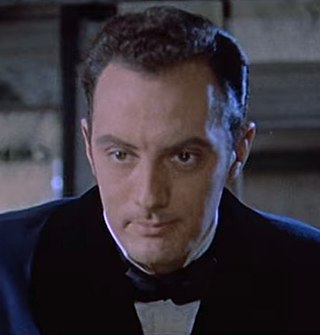
Francis Matthews was an English actor, best known for playing Paul Temple in the BBC television series of the same name and for voicing Captain Scarlet in Captain Scarlet and the Mysterons.
Donald Oscar Banks was an Australian composer of concert, jazz, and commercial music.

Sergei Michailovich Trufanov was a lapsed hieromonk, a charismatic preacher, an enfant terrible of the Russian Orthodox church, panslavist, and actor.
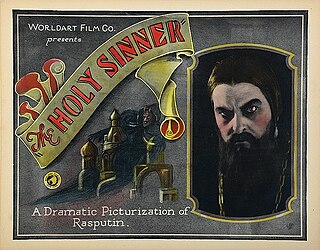
Rasputin, the Holy Sinner is a 1928 German silent film directed by Martin Berger and starring Nikolai Malikoff, Diana Karenne and Erwin Kalser. The film was also released as Rasputin, the Holy Devil and Rasputin's Amorous Adventures. Director Berger made Rasputin into a sympathetic peasant character who was "exploited by the boorish and overly pampered bourgeoisie".
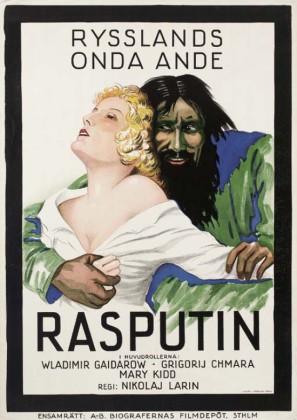
Rasputin, The Prince of Sinners, or simply Rasputin, is a 1928 German-Soviet drama film co-directed by Nikolai Larin and Boris Nevolin and starring Vladimir Gajdarov, Suzanne Delmas and Ernst Rückert. The film's poster showed the tagline "rysslands onda ande", which translates as "Russia's Evil Spirit". It was shot at the Johannisthal Studios in Berlin. The film's sets were designed by Carl Ludwig Kirmse. This film is sometimes confused with another 1928 German silent film made about Rasputin called Rasputin, the Holy Sinner.
